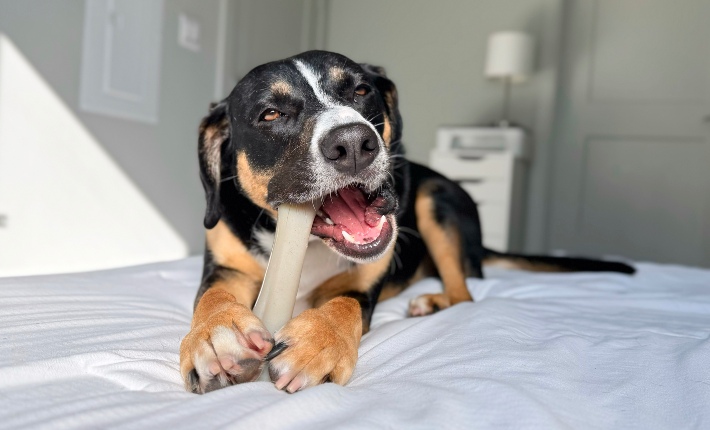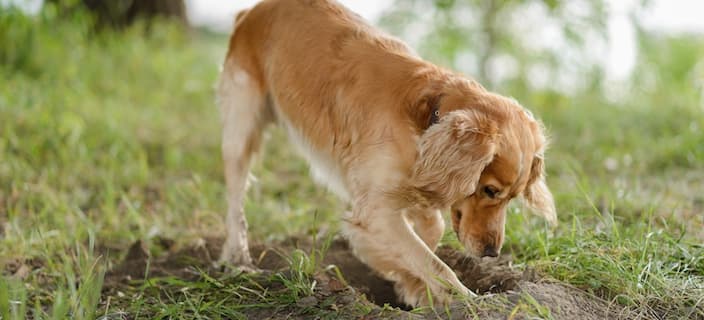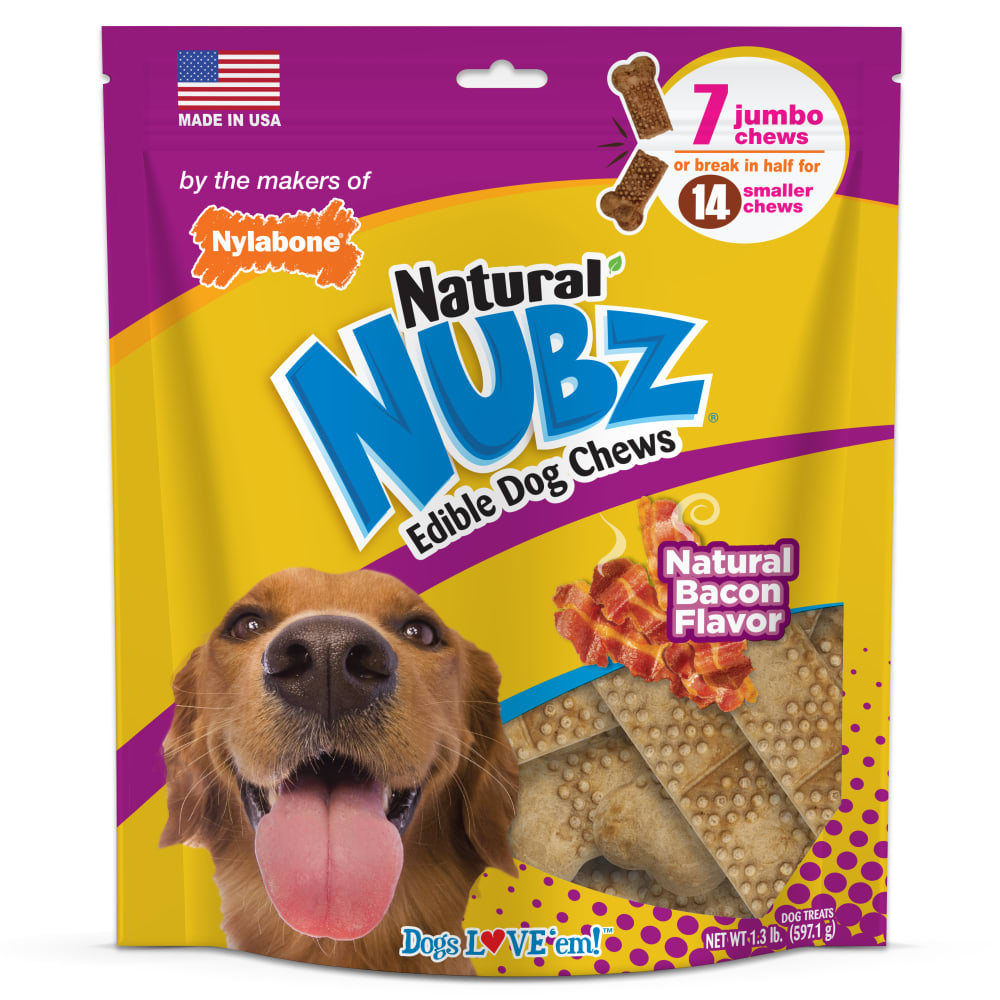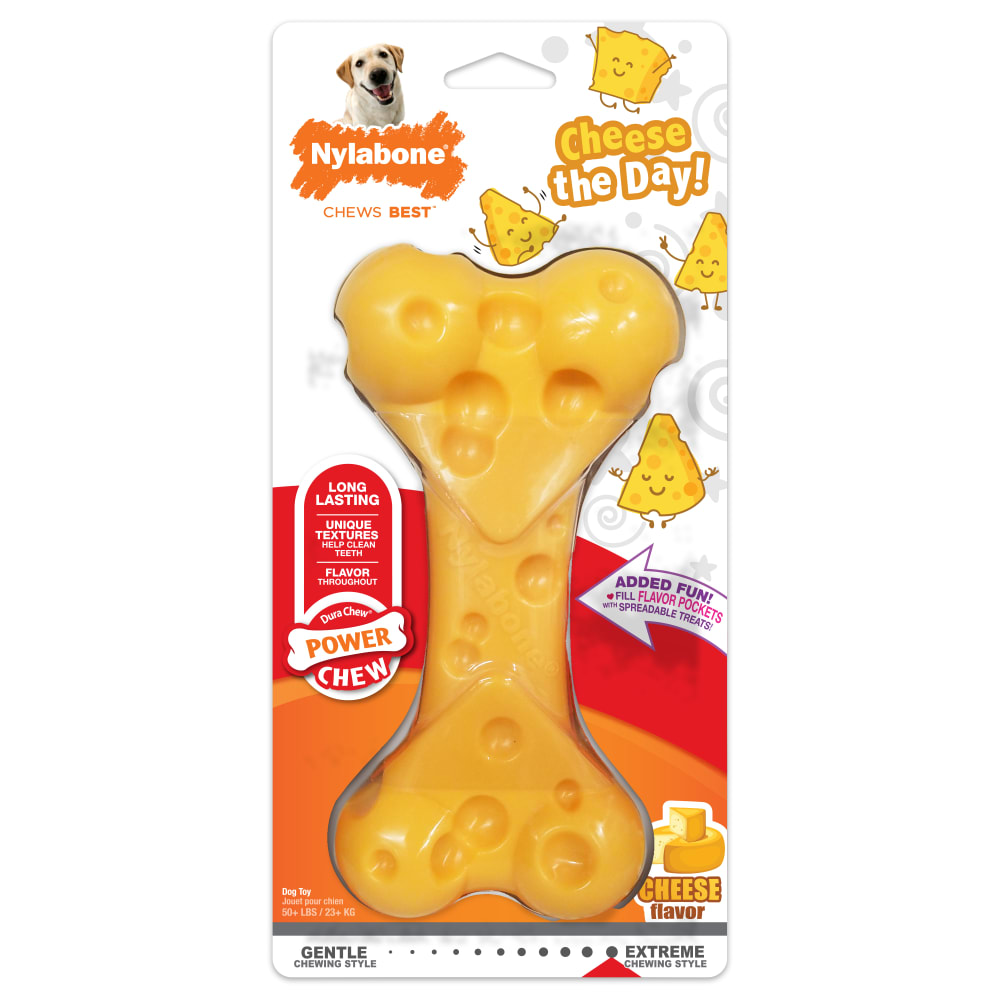Why Do Dogs Dig—And How to Help Stop Them?
Whether your dog is digging holes all over your yard or scratching the carpet, it can be a nuisance! It could have you wondering: why do dogs dig holes in the first place?
There are several reasons why your dog could be digging. They could be acting on their basic instincts from their wolf ancestors, or they could be asking for more attention and playtime! Let’s dig into the reasons why dogs dig.
Reason #1: Dogs Dig Because of Their Ancestral Instincts
The dogs we know and love today are descendants of wild wolves. Even though they’re thousands of years removed from having to hunt their own prey and find their own shelter, today’s pups still have the deep-seated instincts of their ancestors.
Why do dogs dig holes around your yard or garden? They may be chasing “prey.” They may also dig a hole to bury a treat or a favorite toy, instinctually wanting to keep their prized possessions safe from predators.
Do you often see your furry friend digging on beds and couches or scratching the carpet? They may be attempting to create a comfortable “den” by fluffing up blankets or pillows to make a softer place to lie down, as wolves would do with leaves. They could also be trying to warm up the temperature of their sleeping place, as Huskies are known to do, or find a cooler spot underneath a blanket’s top layer, which is common for breeds with heavy coats, like Chow Chows.
Your pup may also dig to mark their territory. Dogs have scent glands in their paws that leave their scent on the ground, according to a scientific report by Nature. Scratching at the ground on walks and in the yard is a way for pups to claim territory as their own, just as they do by marking areas with urine.
Reason #2: Dogs Dig Because of Their Breed

While all pups are known to dig holes, certain breeds are more likely to be diggers than others. Some types of dogs were bred for hunting and chasing prey into the ground, so the reason why these dogs dig today is written into their breed history. These breeds include:
- Terriers: From Jack Russells to Airedales, terriers were traditionally trained to dig tunnels to reach moles, gophers, and other prey.
- Hounds: Hound dogs like Dachshunds, Basset Hounds, and Beagles are known for their keen sense of smell. They have been used as hunting dogs for centuries, and modern-day hounds still have that instinct to chase down burrowing rabbits and other small game.
- Retrievers: While you may think of Retrievers as doing just what their name says—retrieving—these hunting dogs have long needed to rely on their senses to find and uncover downed gamebirds buried among grass, leaves, or water.
Reason #3: Dogs Dig Because They Are Bored or Stressed
A bored dog with a lot of pent-up energy can act destructively. From chewing objects they shouldn’t to digging holes in the ground, dogs can act out when they feel like they aren’t getting enough attention or they need an activity to do. Without the right tools to occupy their interest, dogs will turn to whatever they have handy to keep themselves entertained. This can be especially true for working breeds, like Border Collies and Australian Shepherds, who need plenty of exercise and mental stimulation.
🐶 Related: The Best Types of Toys for Bored Dogs
Dogs that are lonely, scared, or anxious may also engage in destructive behavior. Digging is a common way that dogs self-soothe in reaction to stressful situations. If your pup is whining, scratching, or acting restlessly, they may need emotional support from you.
How to Stop a Dog from Digging
Now that you understand why dogs dig, you can learn how to manage the behavior in your own pup!
Solution #1: Encourage Their Natural Instincts Healthily
Embrace your pup’s deeper instincts! Instead of trying to stop a dog from digging—something that’s in their ancestral or breed history—encourage productive digging. Bury chew toys or treats in a dedicated area of your yard or use a small sandbox. If you don’t have much space, or you don’t want to make a mess, try hiding chew treats in a snuffle mat to tap into your pup’s instinct to dig for prey.
Solution #2: Redirect Your Pup to Safe and Fun Play
If your pup is digging because they’re bored, occupy them with chew toys that will keep them engaged and active. Look for a durable chew toy that will stand up to even the most aggressive chewer. These types of toys provide a healthy outlet for your pup’s natural instinct to chew, plus their unique shapes and textures add an extra dose of fun and entertainment.

Be sure your dog is getting enough exercise and stimulation during the day, too. If your pup gets the zoomies or chases their own tail in addition to digging, it’s a sign they have some pent-up energy. Take them out on a long walk, throw a ball for them to chase, or engage them with a play toy at home.
Remember that some breeds have a lot more energy to burn than others! For high-energy pups, take them somewhere they can run and stretch their legs. For working breeds that need a job to feel stimulated, provide puzzle toys or other interactive toys to put their brain to work.
Solution #3: Help Them Stay Stress-Free
If your pup is digging because they feel stressed, get to the root of the issue.
Is your dog’s stress caused by separation anxiety? Work with your dog to help them feel loved and safe, even when you’re away. Train them to feel comfortable alone; consider crate training if it would be helpful for them. Giving them a favorite chew toy for a chew session before you leave or when you come home can provide a safer outlet for your dog's anxious feelings.
If loud noises like fireworks or thunderstorms trigger your dog’s stress, try providing a distraction with a treat toy. Your pup will be so focused on discovering their treat that they won’t feel so stressed—and won’t be digging anywhere else!
Dig Into More Dog Behaviors
Our furry friends have all sorts of strange behaviors and habits, from digging holes to eating grass. By getting to the core of why dogs dig and what makes them act in certain ways, you’ll start to understand your pup more and know how to provide for their needs in the best way paw-sible.
Find out more about other common behavior problems in dogs and how to solve them!
FOLLOW US!







